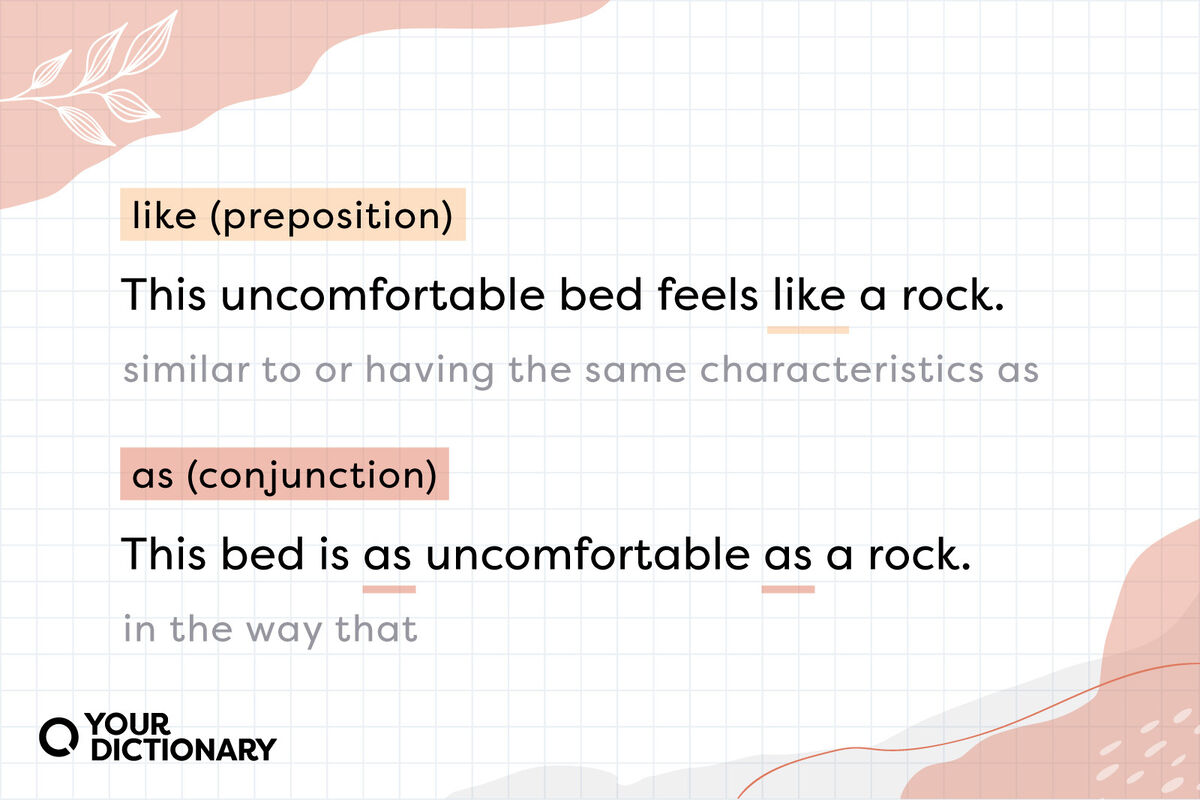
Knowing when to use like or as can get confusing as you explore similes and comparison sentences. The key to differentiating the two is understanding how each word functions. Understanding that function can help you untangle their usage.
Like vs. As: Making Comparisons
Like and as overlap when making comparisons and forming similes. In comparison sentences:
- Like acts as a preposition meaning “similar to or having the same characteristics as.”
- As is a conjunction that can mean “in the way that.”
Even though these definitions are similar, the difference in parts of speech are the keys to understanding how to properly use like and as.
When To Use 'Like'
Prepositions show the relationship between two nouns or pronouns in a sentence. In the case of like, that relationship involves similarity. All the usual rules for using prepositions apply to like in this case, but the most important thing to remember: You must be comparing two nouns when using like.
- That kitten is like its mother.
- Like a tornado, the two year old destroyed the tidy bedroom.
- Many people think children are like their parents.
- This uncomfortable bed is like a rock.
When To Use 'As'
A conjunction connects two clauses to form a single sentence. Other common conjunctions include and, but and or. While like compares nouns, as typically compares verbs and adjectives.
- The car brakes screeched as if they were protesting the sudden change in plans.
- No one makes cookies as she does.
- The car doesn’t run as it used to.
- I live five miles from here as the crow flies.
Using ‘Like’ and ‘As’ in Similes
A simile is a figure of speech that involves comparing two unlike things using like or as. Unlike regular comparisons, similes are generally more poetic and designed to create vivid imagery, but the same rules still apply.
- She was as strong as an ox.
- I slept like a baby last night.
- This new job fits me like a glove.
- He was as sad as a dog who wasn’t served breakfast.
How To Remember the Difference Between ‘As’ and ‘Like’
On the fly, you might not have time to diagram a sentence or figure out whether you’re comparing nouns or verbs. An easy trick to remember the difference: If you can use the way in place of the word, you should use as. If not, you probably want to use like.
- No one looks the way they did 20 years ago.
- No one looks as they did 20 years ago.
Other Forms of ‘Like’
Along with its use in comparisons, like has a whole bunch of other meanings.
- Like (conjunction) - as if; in the same way as
- The motorcycle runs just like new.
- Like (adverb) - a filler word
- She, like, didn’t know what to say to him.
- Like (verb) - to take pleasure or enjoyment or find agreeable
- I like frozen grapes.
Other Forms of ‘As’
As also has a wealth of other uses. What’s tricky is that many of these also take the form of conjunctions.
- As (adverb) - to a similar extent, degree or amount of something
- It’s as cold today as it’s ever been.
- As (conjunction) - at the same time as
- I snuck a cookie off the plate as she looked away.
- As (conjunction) - because; since
- I can’t eat too much now as I have a family dinner soon.